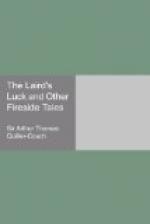“The Lutheran dogs have gone, and have taken the city’s victuals with them.”
“I do not want to live, my friend.”
“Granted: but I do not think that Juanito, here, is quite of your mind.”
She considered for a moment. “I will go with you,” she said: and we quitted the patio together.
The gate opened upon a narrow alley, encumbered now with charred beams and heaps of refuse from a burnt house across the way. The fury of the pirates had been extravagant, but careless (as Felipe had said). In their lust of robbing, firing, murdering, they had followed no system; and so it happened that a few houses, even wealthy ones, stood intact, like islands, in the general ruin. For the most part, to be sure, there were houses which hid their comfort behind mean walls. But once or twice we were fairly staggered by the blind rage which had passed over a mansion crowded with valuables and wrecked a dozen poor habitations all around it. The mischief was that from such houses Felipe, our forager, brought reports of wealth to make the mouth water, but nothing to stay the stomach. The meat in the larders was putrid; the bread hard as a stone. We were thankful at last for a few oranges, on which we snatched a breakfast in an angle of ruined wall on the north side of the Cathedral, pricking up our ears at the baying of the dogs as they hunted their food somewhere in the northern suburbs.
I confess that the empty houses gave me the creeps, staring down at me with their open windows while I sucked my orange. In the rooms behind those windows lay dead bodies, no doubt: some mutilated, some swollen with the plague (for during a fortnight now the plague had been busy); all lying quiet up there, with the sun staring in on them. Each window had a meaning in its eye, and was trying to convey it. “If you could only look through me,” one said. “The house is empty—come upstairs and see.” For me that was an uncomfortable meal. Felipe, too, had lost some of his spirits. The fact is, we had been forced to step aside to pass more than one body stretched at length or huddled in the roadway, and—well, I have told you about the dogs.
Between the Cathedral and the quays scarcely a house remained: for the whole of this side of the city had been built of wood. But beyond this smoking waste we came to the great stone warehouses by the waterside, and the barracks where the Genoese traders lodged their slaves. The shells of these buildings stood, but every one had been gutted and the roofs of all but two or three had collapsed. We picked our way circumspectly now, for here had been the buccaneers’ headquarters. But the quays were as desolate as the city. Empty, too, were the long stables where the horses and mules had used to be kept for conveying the royal plate from ocean to ocean. Two or three poor beasts lay in their stalls—slaughtered as unfit for service; the rest, no doubt, were carrying Morgan’s loot on the road to Chagres.




